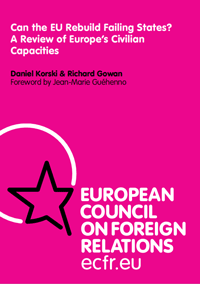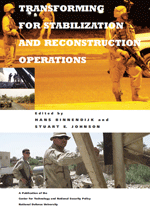 This is the first contribution from one of regular contributors Admiral (retired) Pierre Sabatié-Garat. The author has extensive military, industrial and diplomatic experience in dealing with both European and American militaries. Here he provides a commentary on the interesting recent publication of the European Council on Foreign Relations on the subject of the civilian capacities to be provided in nation building efforts.
This is the first contribution from one of regular contributors Admiral (retired) Pierre Sabatié-Garat. The author has extensive military, industrial and diplomatic experience in dealing with both European and American militaries. Here he provides a commentary on the interesting recent publication of the European Council on Foreign Relations on the subject of the civilian capacities to be provided in nation building efforts.
***
Time to rethink ESPD
“It is time for a rethink of European Security and Defense Policy (ESDP). The 27 EU member states need to make a serious effort to improve their civilian capabilities if their words of support for the ‘comprehensive approach’ are to sound anything other than hollow.” Clearly, the authors of the last pamphlet[1] issued by the European Council on Foreign Relations (ECFR) are not very impressed by EU’s usual self-satisfaction about the success of its overseas interventions.
For Daniel Korski and Richard Gowan, the efficiency of these interventions is at least questionable: “Most EU missions remain small, lacking in ambition and strategically irrelevant”. And here is a first point: the lack of European strategy. Despite a fairly long and cumbersome decision making process, overseas operations are too often the result of a convergence of impressions, limited by budgetary considerations, rather than the rational application of a well established strategy aiming at promoting European interests and values. Despite Javier Solana’s (the head of the ESDP effort) impressive and continuous efforts, such a common strategy is still to be written.
Korski and Gowan are not convinced by the reality of the European “civilian power” as too many member states are not serious about it: “Some countries appear to take their ESDP responsibilities extremely seriously; others barely make the effort.” A comparison after a dozen or criteria allows the authors for distributing the EU countries into four categories: the professionals, the strivers, the agnostics and the indifferents. This observation derives from the former one: without a common strategy, it is difficult to convince the member states to make important efforts to select, train, and fund civilian capabilities ready to be deployed.
Both these points should be rapidly taken in consideration in application of the Lisbon treaty. If they are not, there is no chance for Europe to stay a credible player in the settlement of hard crises.
Korski and Gowan see no fundamental reason for such a lack of results: “while the EU is a long way from delivering a joined-up ESDP approach that combines diplomatic, developmental, commercial and military instruments, there is no doubting its potential to do so considering the size of the EU’s economy, the attractiveness of its consumer market, its role as a pre-eminent provider of foreign aid and its considerable military capabilities.”
To improve EU’s “civilian power” efficiency the authors propose several axis of effort.
A new mission concept is needed as the methods that allowed a relative success in Bosnia are much less pertinent for the type of interventions the EU is presently involved in. The need is now for swift deployment, with enough security measures in hostile environments and a large autonomy for the civilians deployed.
Nevertheless, the measures proposed by the authors still describe the civilian operations as following the military ones. It is now recognized that there must be a total interlinking of both aspects of one and the same operation.
 Hans Binnendijk of the American National Defense University was among the very first strategic thinkers to draw this important lesson from the Iraq campaign. For him, in this kind of operation there is a fairly short window of opportunity for winning the “hearts and minds”. The high tempo of military operations and the avoiding of in-cities fighting leave the population hesitant on its behavior vis-à-vis the intervention. For several days, as long as the existing local administration is left in place, the population is ready to accept anything positive coming from the intervening forces. Here, to re-establish as soon as possible the water and electricity networks together with the food supply becomes of strategic importance.
Hans Binnendijk of the American National Defense University was among the very first strategic thinkers to draw this important lesson from the Iraq campaign. For him, in this kind of operation there is a fairly short window of opportunity for winning the “hearts and minds”. The high tempo of military operations and the avoiding of in-cities fighting leave the population hesitant on its behavior vis-à-vis the intervention. For several days, as long as the existing local administration is left in place, the population is ready to accept anything positive coming from the intervening forces. Here, to re-establish as soon as possible the water and electricity networks together with the food supply becomes of strategic importance.
Hence the necessity to insert such civilian actions at the very beginning of operational planning. To have at disposal the necessary civilian means within hours, and not within months, implies to dedicate enough air and ground lift to this part of the operation. Clearly such a decision has to be taken at the highest level of command. This modus operandi is seen as the best way to preempt insurrections and, as a result, to reduce the need for further military actions.
Prevention should be played as much as possible. Operation “Concordia” in Macedonia, where NATO and EU set up an efficient cooperation, was a great success by avoiding the extension of the Kosovo conflict to the whole region.
The political guidance and the chain of command of the EU’s civilian operations should be less bureaucratic and give a wider autonomy to the EU Special Representative (EUSR): “Delegation is key, Korski and Gowan say, the EUSRs will be in charge of all facets of any EU intervention, and will refer back to resident EU ambassadors rather than to Brussels.” They advocate for a greater cooperation between the EUSR and the local governments. They even recommend an early positioning of EUSRs in countries “at greater risk of instability”. Such an anticipation is always difficult. Nevertheless, to gather a hundred or so out of the existing 40 000 national diplomats in a crisis prevention cell and to keep at disposal two dozen of potential EUSRs should be within reach of the future EU External Action Service, the new European diplomatic corps.
Comparison with the UN intervention is not fully pertinent as both organizations usually act in a complementary manner. UN track record in Bosnia is controversial, as it is in Congo or in Sierra Leone. Nevertheless, Jean-Marie Guéhenno, former UN Under-Secretary-General for Peacekeeping Operations, explains that the temptation of micromanagement from Brussels too often kills EUSR initiative on the field. He advocates for greater integration of the military and civilian chains of command, under the authority of an autonomous EUSR.
Time to rethink Nation-building
In their analysis of the EU missions during the last decade, the authors pick out several structural weaknesses:
- Justice reforms and police training can simply not been undertaken in countries where basic security is not ensured, like Iraq, Afghanistan and Congo. Such civilian missions should be part of military operations. It is too difficult to ask other organizations to protect a large amount of civilian personnel engaged in a different framework. Therefore task sharing between NATO for military and the EU for civilian missions is not an option as long as robust military actions are needed. The Iraq example shows that despite the active presence of 120 000 US troops and a considerable civilian aid, Iraq still don’t have an electoral law and the civilian power is very weak.
- The pool of police officers who volunteer to serve in peace operations is not so large, and the number of missions is regularly increasing. Therefore the periods of rest between two missions shorten, and people are overstretched.
- The EU’s planning process for civilian operations lacks of experienced civilian planners, and relies on military planning methods. Those methods are not always suitable for this kind of operations. The Commission and the Council often produce their own plan, both being not always compatible, or at least not producing the best synergies. The authors speak in favor of a “single, integrated plan.” Clearly this will be one among the first tasks Lady Ashton will have to undertake in setting up its new External Action Service.
The pamphlet paves the way for this new European organization: “With its extensive network of embassies and diplomatic missions, the access it enjoys to both civil and military instruments and its broadly favourable global reputation, the EU should be uniquely well placed among global foreign policy actors to deal with the challenges posed by fragile and failed states.”
In a recent interview to the French newspaper Le Monde, Javier Solana points his finger towards the main and perhaps the greatest difficulty for setting up an effective organization for crisis management. He calls for a really shared responsibility between the EU nations: “ It’s necessary that all member states accept to play their role, especially those with a long international tradition. Everyone understands that efficiency in action derives from collective structures producing added value.”
However the authors don’t tackle the core paradigm of civilian operations. The success of those interventions is not simply a question of organization, proper manning or command structure. The political aim should be properly assessed in the local context.
It is necessary to completely re-think the very notion of nation building, which shouldn’t be to impose western-like models of governance. Freedom and justice can be perceived differently in other parts of the world with different cultures. Feudal and tribal organization of the society will prevail for long time, even with a so-called “democratic” varnish, as it is the case in Pakistan, even in the educated part of the population. The EU External Action Service should lead such a reflection and find genuine solutions.
[1] « Can the EU Rebuild Failing States ? A Review of Europe’s Civilian Capacities », Daniel Korski and Richard Gowan (European Council on Foreign Relations, October 2009)
———-
***Posted December 14th, 2009

